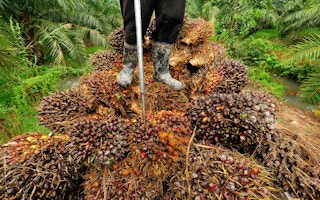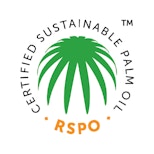Palm oil is a highly efficient crop. It is many times more productive than any other sort of oilseed crop such as soybean or canola, so requires less land to grow. It is also highly versatile, used in everything from cooking oil to lipstick.
And yet the palm oil trade is blamed for a smorgasbord of sins, from deforestation, to climate change, human rights abuses, biodiversity loss, and the forest fires that blanket much of Southeast Asia with a toxic haze almost every year.
However, pressure from buyers, environmental groups and consumers has forced the industry, which is expected to be worth US$88 billion by 2022 as demand for the oil surges, to change.
After more than a decade of activist campaigns, public petitions and lawsuits, some of the industry’s biggest growers have pledged to stop destroying forests to make way for plantations, and encourage third party suppliers and smallholder farmers to do the same.
To push the industry towards sustainability, a group of NGOs, growers, manufacturers and retailers banded together to set up the Roundtable on Sustainable Palm Oil (RSPO) in 2004. Among RSPO’s main principles were for members to avoid clearing primary or secondary forest deemed of high conservation value, use fire to clear land, and to ensure that the rights and welfare of the communities, plantation workers and their families are protected.
Over the last 13 years, RSPO has provided a platform for the industry to change. Now, the group has 3,583 members, including 72 growers and 304 mills that have been RSPO certified; 1,128 companies have had their supply chains certified. This amounts to 11.61 million tonnes of certified sustainable palm oil produced in a year.
But despite the RSPO’s efforts to incentivise the industry and a concerted effort from the growers, only 19 per cent of all palm oil sold globally is certified sustainable. This raises the question: why isn’t all palm oil sustainable now?
“
There is an economic disconnect between consumer demand for sustainable products and their willingness to pay.
Anita Neville, vice president of corporate communications and sustainability relations, Golden Agri-Resources
The answer may lie in the fact that on the best of days, palm oil is a complicated business. It involves complex, fragmented supply chains, often starting at the doorstep of a smallholder farmer who tends to a few hectares and sells bunches of oil palm fruit for cash to traders, usually without proper documentation.
To improve the transparency of these supply chains, most companies in the sector have committed to achieving full traceability of palm oil back to the plantation.
But as Anita Neville, vice president of corporate communications for Singapore-listed palm oil giant Golden Agri-Resources says, this is a resource-intensive process, and the real work lies in engaging with these suppliers to achieve change.
This includes the logistics of mapping the mills that supply to the company, and in turn, the farmers who supply to the mill. Then, palm oil companies must establish trust with smallholders, and navigate a web of cultural and behavioural factors to drive a change in how they operate, including the elimination of the slash and burn approach to land clearing that has troubled the sector for decades.
“The time and labour intensive nature of the process makes it frustrating for people looking in from outside the industry, who all want a positive transformation to happen yesterday,” she says.
Sustainable palm oil is also expensive. A tonne of CSPO can cost as much as US$30 more than conventional options, depending on the type of certification a buyer opts for; this is at odds with consumer expectations for cheap food and personal care products, shares Neville.
“There is an economic disconnect between consumer demand for sustainable products and their willingness to pay,” she states.
Neville argues that the palm oil industry has done more than any other sort of agribusiness to try to strike a more sustainable balance between economic growth and environmental protection, but continues to fall under global scrutiny.
More palm oil growers are adopting policies committing them to responsible production, she says. But can the industry ever be fully sustainable? Eco-Business asked palm oil companies, an environmental group and RSPO for their views.
Petra Meekers, director of corporate social responsibility and sustainable development, Musim Mas
There’s no straightforward answer; different stakeholders have a different view. Is RSPO the acceptable bar for sustainability? Or is it the Palm Oil Innovation Group [set up in 2013, which goes beyond the requirements of RSPO]? Or do we take into account that we have national schemes such as ISPO [the Indonesian Sustainable Palm Oil, a standard that is mandatory for growers, mills and suppliers in Indonesia, which is generally considered weaker than RSPO’s requirements]?
Similarly, what is your definition of land that is high carbon stock, and that which can be used for agricultural development—and not only for palm oil? And who will pay for leaving the forest standing?
We do need to look at land use planning from the landscape level. In developing nations where palm oil is being grown, a land use plan must take into account the development options; what belongs where and why. Forests, communities and agriculture—they all need to be given a place, and to keep some forests standing, you need to ensure the livelihoods of local communities are taken care of.
Stefano Savi, global outreach and engagement director, Roundtable on Sustainable Palm Oil
Achieving full sustainability of the oil palm industry is not only possible, it’s essential. There’s no other way to fulfill the needs of today without jeopardising the needs of future generations.
Overcoming the challenges ahead to find this equilibrium will be possible only if all stakeholders are brought together within an inclusive process. The key will be to find local solutions to local issues, that can work within an international framework.
Elizabeth Clarke, global palm oil lead, World Wide Fund for Nature
Meeting the certification requirements of a credible, multi-stakeholder certification scheme is the best way for a company to ensure that the palm oil they produce or use meets rigorous sustainability standards in a transparent and verifiable way. Even the most credible of systems need to be continually strengthened, adapted and improved and WWF is involved in such processes, such as the current review of the RSPO Principles and Criteria.
While WWF is encouraged by the recent upsurge of sustainability commitments by companies, particularly in Asia, more companies need to go beyond commitments and take concrete action.
Voluntary certification schemes and other innovations in the private sector cannot ensure sustainability of the global palm oil supply chain on their own. Unsustainable palm oil production has continued to threaten forests, wildlife and people despite more businesses having taken action.
Colin Lee, director of corporate affairs, Cargill Tropical Palm Holdings
All stakeholders of the industry – smallholder farmers, commercial growers, processors, traders, food manufacturers, governments and civil society groups – must work together constructively, transparently, and stay aligned in promoting sustainable practices while ensuring the needs of all stakeholders are met from social, economic and ecological perspectives.
A fully sustainable, productive and viable industry requires an environment that encourages parties who genuinely need help in improving their practices to step forward without fear of persecution. Taking a purely punitive approach can be counterproductive as it can drive errant companies away from any effort, internal or external, to do better.
The RSPO was set up as a multi-stakeholder platform to ensure the industry as a whole shifts to a sustainable path. While some criticise its consensus-driven approach as being too slow, lasting change can only be achieved when a critical mass of industry actors makes the shift and sends a clear signal that Certified Sustainable Palm Oil is the future.
As the African proverb goes: “If you want to go fast, go alone; if you want to go far, go together.” For the palm oil industry to fully be sustainable, all stakeholders must make the journey together and leave none behind.






















